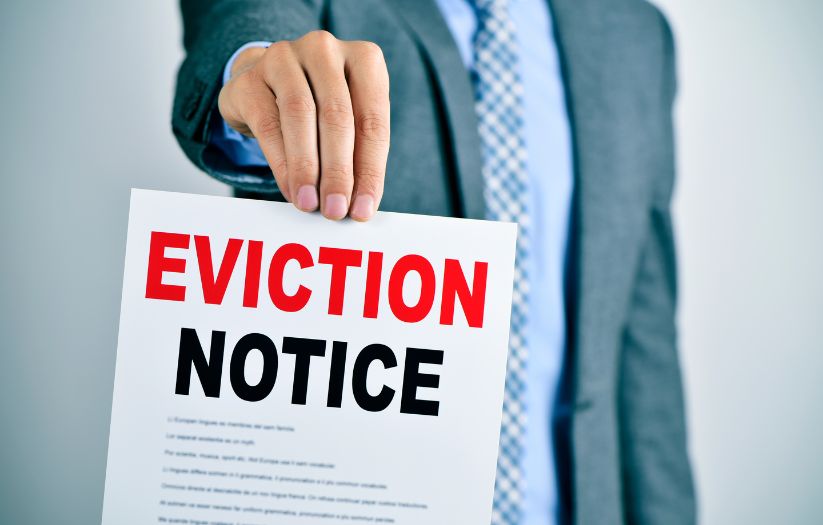
There are a lot of different situations that can strike fear in a landlord’s heart, but none hit quite as hard as having an unreliable tenant living in your property. Once you’ve signed a lease with a tenant, there isn’t much that you can legally do to end that lease early even if the tenant is causing you grief at every turn.
The simple fact is that you are in a legal contract, and you will often need to use legal methods such as the CT eviction process to end that contract.
Not all landlords want to go through the eviction process
Some landlords just want their property back; they don’t even care about the situation being remedied or money owed being repaid. Landlords and CT Property management companies must learn how to deal with bad tenants without breaking any rules, and that can be difficult.
Remember, however, that following the letter of the law when handling tenant situations is essential. If you try to force a tenant to leave or use sneaky ways to get rid of bad tenants, you might find yourself on the wrong side of the courtroom!
Today, we’ll discuss how you can take on the tragedy of having a bad tenant who just won’t leave. With these methods, you can regain control of your property!
A Table Of Contents For How To Make A Tenant Want To Leave
- Common Tenant Problems For Landlords
- The Legal Issue Of Bad Tenants
- Encouraging Tenants To Leave With Cash
- When You Need To Evict
- How To Avoid Risky Tenants
Common Tenant Problems For Landlords


As a landlord, you’re going to come across tenant problems from time to time. Even if you spend hours screening tenants and doing as much recon as possible before you make any lease agreements, you might still find yourself grappling with the worst tenants imaginable.
Unfortunately, that’s just part of the business!
To be ready to deal with the prospect of bad tenants, it’s good to always be aware of what you might be facing when you start renting properties. Some problems with tenants, after all, are more common than others!
These are some of the most common tenant problems that landlords have to deal with:
- Late rent payments
- No rent payments
- Property damage
- Not taking care of the lawn or outdoor spaces
- Parking illegally
- Illegal activity on the property
- Fighting with neighbors
- Disturbing neighbors
- Keeping pets at no-pet properties
- Letting extra people move in permanently
We’ve just named a few of the many problems that tenants might cause you. Some of those problems are big enough to give cause for a legal eviction; others, however, are not. And that’s where the legal issue of figuring out how to get rid of a bad tenant comes into play.
The Legal Issue Of Bad Tenants
If a tenant breaks the rules of your lease agreement, you have grounds to evict them. If, however, they’re doing things that are generally frowned upon but difficult to prove or not made clear in the lease agreement, going into a legal eviction battle could be exhausting.
And for some landlords, the prospect of needing to deal with eviction at all is exhausting!
It can be hard to figure out so-called sneaky ways to get rid of bad tenants, however, because it is illegal to force, threaten, or blackmail a tenant into leaving. Even if you don’t want to stoop to these actions, you can find yourself accidentally doing these things in your desperation to get rid of a problematic tenant.
While we are going to recommend some non-eviction methods for how to make a tenant want to leave tonight, we want to remind you that all of these things need to be done from a place of mutual benefit for both you and the tenant. Be careful about how you treat your tenant.
Never Do These Things
Remember to be kind and follow the laws. Otherwise, you could find yourself in a legal battle! What exactly does that mean for you as a landlord?
There are a number of things that can be tempting to do as a landlord when you just want a tenant to leave, but these things are illegal and could wind up costing you more than you bargained for.
When you are trying to figure out how to deal with bad tenants, follow these rules:
- Never change the tenant’s locks without notice.
- Don’t try to physically remove the tenant yourself, even if you have an eviction ruling.
- Never harass the tenant by calling them, stalking them, or showing up at the property without notice.
- Do Not turn off the utilities at the property to scare them away.
- Don’t remove the tenant’s property – this is stealing.
- Never try to blackmail them into leaving.
Reading through this list, it may seem very obvious that these are all major no-nos. Desperate times, however, can make you reach for desperate measures. Keep your cool and avoid these actions at all costs.
Encouraging Tenants To Leave
It is illegal to force a tenant to leave by locking their property, moving their belongings, or otherwise impeding yourself on their lives. After all, you have a responsibility to keep the property to a livable standard until the lease between you is legally over.
That being said, it is possible that you can talk with your tenant and encourage them to leave without needing to go through eviction or get yourself into any trouble.
The chances are high that your tenant is just as unhappy with the living situation as you are, so they may be amenable to this method.
Cash For Keys
This is the most common method of non-eviction move out that is used by landlords. Commonly known as cash for keys, this is a scenario in which you pay the tenant to move out. Yes, it’s that simple.
In some situations, a tenant needs to go. If they’re constantly paying rent late or causing general grief, you will eventually need to evict them. Sometimes, you can speed up that process by simply working it out with the tenant directly.
Here is how this situation usually goes when you’re working with problem-causing tenants:
- Explain The Situation Clearly
The first thing that you need to do is explain why you want the tenant to leave. In some cases, they might not realize the problems they are causing. They may even change, but you shouldn’t expect this outcome. Instead, be clear that you believe they’re in the wrong. Let them know that you will be filing for eviction if nothing changes. - Offer Them Something
Once you’ve explained the “why” behind what you want, offer the tenant a lump sum to move out as soon as possible. Explain how this lump sum will save them money (and their credit) in the long run.The lump sum would depend on how high (or low) the rent is in a specific area. Be sure to let them know you also forgive any balances that they owe. - Sign An Agreement
If the tenant agrees to your terms or you work out a deal, write up an official agreement and ensure both parties sign it. This agreement is your legal documentation that the original lease no longer applies. Be sure to return any security deposit that they are owed, then change the locks once you have the keys back. You’re good to go.
A lot of new landlords are baffled by the idea that they should give a bad tenant extra money to leave. The simple fact, however, is that evictions can take weeks or more. And sometimes, an eviction case will end with you being legally required to give the tenant another chance.
If the tenant is willing to leave for your lump sum offer, then, you are saving both you and the tenant a lot of unnecessary grief. A lot of tenants will be happy to have this easy way out of what is a bad situation for them, too. And if they don’t like or agree to the idea, you simply move on to legal eviction!
Honest Conversation
If you aren’t comfortable or willing to offer bad tenants the cash for keys out, you can try having an honest conversation with them about where the situation is headed: eviction.
When tenants have caused enough problems to quality for eviction, you should file for eviction.
If you know that you are going to file for eviction, give your tenant a call to let them know how serious you are about the situation:
- Let them know that you plan to file for eviction.
- Explain the parts of the lease that they are breaking.
- Let them know whether or not they will have a chance to fix things or if the eviction will be permanent.
- Ask if they are willing to move out of their own accord without the eviction process.
It might sound strange to just ask them to leave, but most bad tenants are not being bad on purpose. They might be struggling with their personal lives, or they just didn’t realize how much of an issue they were causing. When you bring it to their attention, many would rather leave without having an eviction on their credit record.
Tenants that agree to leave will probably appreciate your support in finding somewhere else to live.
While you don’t want to trouble any other landlords with problematic tenants, you can find small ways to help them find a new living situation and be better tenants in the future. Giving them recommendations for complexes in their price range or contact information resources like the local Public Housing Authority that can help them find a better rental situation can go a long way.
In the end, you’ll be helping other landlords, too!
When You Need To Evict


Ultimately, there are going to be situations when you simply need to get a tenant to leave. There’s no way around it; you’ll have to file for eviction. You cannot make a tenant that doesn’t want to leave get out without a legal eviction ruling, so you have to rely on the court system.
Once you’ve realized that eviction is your best option, file as quickly as possible. The sooner that you get an eviction notice to the tenant, the sooner you can file for eviction with your local courthouse.
The eviction process can seem tedious, but you’ll be able to regain control of your property as long as you can show proof of what the tenant has been doing.
How To Avoid Risky Tenants
Nobody wants to have to convince a tenant to leave. Landlords prefer to never have to deal with eviction cases as they are expensive in terms of both time and money. So, what can you do instead?
Ultimately, the best way to avoid having to deal with bad tenants is to avoid renting to bad tenants to begin with. There is no 100% method for avoiding bad tenants, but there are ways that you can lower the risk that you take when renting your property out.
Make sure that you are finding the best ways to choose the right, low-risk tenants from the beginning:
- Screen tenants thoroughly.
- Do not accept tenants that don’t fill out the entire rental application.
- Call their references.
- Check pay stubs and employment facts with their employer.
- Use a tenant screening service to make screening easier.
- Complete background and credit checks.
The key point here is that you shouldn’t rent to someone just based on feelings; make sure you are choosing tenants based on the facts of their application. People with bad rental histories are used to sweet-talking their way into a new lease agreement, but their record will show you just what they have put other landlords through.
By ensuring that you follow a strict screening regiment when choosing what tenants to rent to, you’ll have a much lower risk of encountering bad tenants!
Don’t Let Bad Tenants Be Forever Tenants
When you are not sure how to deal with bad tenants, it is easy to let weeks turn into months as you try to find ways to convince them to leave. When it comes down to it, you shouldn’t let bad tenants remain in your property if they are causing permanent damage, not paying rent, or breaking any other terms of the lease.
If convincing the tenant to leave with your words or cash doesn’t work, you will have to turn to eviction. Eviction, though stressful, is a very powerful tool that has been created to help landlords. Don’t be afraid to use it when you need to.
After all, you could waste a few weeks on eviction or spend a few months dealing with bad tenants. In the end, the choice is yours!


